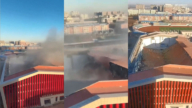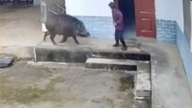【新唐人2014年09月06日讯】日前,中共监管层传达出房地产行业最新政策动向,将允许已上市房地产企业,在银行间市场发行中期票据。专家认为,这是中共在采取不断印制钞票,以及推行限购,放宽第二套房贷款等各种政策失灵的情况下,采取的又一刺激措施。但这一行为,不但会让等待房价下降后购房的民众失望,也无法长期持续,挽回房地产崩盘结局,却会给中共政权埋下了隐患。
网易财经频道9月4号报导,有消息称,国内上市房企获准在银行间市场发行中期票据。交易商协会债券市场专业委员会也证实,他们在上周五召开会议,审议了上市房企在银行间市场发行中期票据一事。
“中期票据”是指期限通常在5-10年之间的票据,发行额度一般不少于30亿元,不仅注册方便,发行程序简易,而且成本也低。
大陆一名房地产董事长表示,上市房企开闸中期票据,不仅让上市房企资金链彻底宣告摆脱困境;使房价大幅下跌的可能性被软着陆取代;同时有利于上市房地产企业的股票估值。
旅美经济评论家马杰森:“其实,是中共给这些企业开出来一个融资渠道。是有保证中国房地产不会崩盘的想法在里头。如果它没钱的话,他就会狂抛,这也是饮鸠止渴的一个方式。如果销售一直提不上来,它借的这些钱还是要还的,而且还要还利息。如果将来房地产越来越不看好,中期债卷的利息会可能会越来越高。如果中国房地产大环境不改,这个举措只是借一个燃眉之急。”
据大陆媒体报导,中国大陆的房地产企业正面临着极其严峻的资金危机,超过四成的房产企业,负债率超过了百分之百,部分公司的净负债率激增至300%以上。尤其上市房企的真实负债率水平全面高涨,已经接近历史峰值。
北京大学光华管理学院博士生导师王建国,曾经向《新唐人》表示,其实最害怕房价掉下去的是政府。
前年8月,《人民网》引述专家的话说,高房价里有高达70%的税费,流进了政府的“钱袋”。之后在12月,财政部公布了11月份全国财政收入数据。显示和前一年同期比,房地产营业税增幅近60%。
去年10月底,中共国务院发展研究中心主任李伟说,中国房地产已经出现泡沫破裂现象。不过今年一月份,央行马上投放现金1.79万亿元,创下近四年来最高水平,但房价不但没有上去,当月人民币存款却减少了接近1万亿。专家认为,央行一放水,有钱人赶快卖掉房子逃往其它国家。
中国金融智库研究员巩胜利:“房地产是最大的一个产业,一掉下来对中国的经济影响非常大。中国地方政府很多靠土地在生存,没有房地产中国地方政府怎么办?所以它现在采取了一种新的刺激方法,发行票据也就是货币的再供应,也是一种短期的行为,不可能长期。”
目前在全国二、三线城市空城、鬼城随处可见。最近一位房管局长在新华网刊登文章说,现在房子多得吓人。仅根据国家统计局的数字到去年年底,中国新区规划出来的新城,就能住下34亿人口,加上原来7.3亿的城镇人口,一共高达约40亿人。相当于中国的城市能装下超过全世界一半的人口!
大陆经济评论家牛刀:“它的购买力就那么多,购买力一旦耗完它照样崩。崩盘是迟早的事情。这样一来埋下的这种隐患,造成的这种破坏性它就没有办法,政权要出问题。共产党现在搞不下去了。搞不下去了,你就让别人搞嘛。但是它又不会让,你杀我、我杀你,整个社会都动荡了。”
目前,地产商因为资金链断裂而跑路,跳楼的事件时有发生,而业主因此维权的事件也风起云涌。
采访编辑/刘惠 后制/李勇
Who is the Loser in Real Estate’s Medium-Term Notes?
Sources say that China regulators approved a
new real estate policy, allowing those that qualify, to sell
medium-term notes (MTN) in the inter-bank bond market.
Experts say that this is yet another unworkable measure by the regime
as when it consistently printed bank notes,
carryied out purchasing restrictions and relaxed mortgage loan
restrictions which didn’t work.
The new measures have not only disappointed buyers
who are waiting for the housing prices to fall, but they also cannot
hold out for too long to prevent the housing bubble burst.
It leaves potential problems for the CCP.
Chinese internet company NetEase cited sources that
listed property companies are allowed to sell MTN’s in the
inter-bank market.
National Association of Financial Market Institutional
Investors also confirmed that:
they held a meeting last Friday that discussed the issue of MTN.
MTN is a debt note that usually matures in 5-10 years.
The minimum amount of issue is 3 billion yuan.
MNT’s are easy to register and simple to issue, and the cost is low.
A Chairman from a Chinese-based property firm says that
listed properties for sale with MTN’s will help the property fund
chain to get rid of a difficult situation completely,
also the possibility of a sharp price fall will be replaced by
a soft landing.
It is also good for listed property firms to evaluate its stocks.
Jason Ma, US-based economic commentator: “Actually,
the Chinese Communist Party (CCP) has opened up a channel
for these companies to raise money.
The CCP intends to ensure that real estate will not collapse.
If there is no money, they will sell bonds.
This is a way to help in an emergency situation.
If the sales haven’t improved, the borrowing still
needs to be repaid plus interests rate.
If the real estate marketing gets worse in the future,
the interests rate of the MTN’s will increase more and more.
If the property environment doesn’t change, the new measures
can only solve the problems in an urgent situation."
According to Chinese media, property sectors in China
are facing a serious financial crisis.
Over 40% of property sectors’ debt ratio has exceeded 100%.
Some companies’ Net Gearing Ratio increased to over 300%.
Especially real Gearing Ratio of listed property firms are all increased.
It almost reaches an historic high.
doctoral tutor of The Guanghua School of
Management, Peking University had spoken to NTD Television.
He said that it was the government that worries most about
the housing prices going down.
In Aug. 2012, people.cn cited experts that 70% tax from high
price property has been taken by government.
In Dec. 2012, the Ministry of Finance announced November’s
data of national fiscal revenue.
It shows that tax on property sales has increased
nearly 60% year-on-year.
Last October, Li Wei, director of Development Research
Centre of the State Council said that the housing bubble has
burst in someway.
In January this year, the Central Bank injected 1.79 trillion yuan,
which is the highest level over the past four years.
However, the housing price still hasn’t risen.
The bank deposits have reduced by
nearly 1 trillion yuan in the same month.
Experts observed that once the Central Bank injected money,
rich people sold their houses quickly then escaped abroad.
Gong Shengli, researcher of Chinese Financial Think Tank:
“Real estate is one of the biggest sectors, once it falls, it would
greatly impact on the China’s economy.
Many local governments rely on land,[revenue]
What will they do without the property sectors?
So the regime launched new stimulus measures;-to issue bonds,
which means issue currency again.
It is a short-term action, but cannot last long."
In China’s second and third tier cities, ghost towns are everywhere.
Recently, a director of property management bureau has
published an article in Xinhua website.
He said that the quantity of houses in newly
designed areas is scary.
According to national statistics, at the end of last year, projects of
new cities in new areas can take a 3.4 billion population.
To add up an existed 7.3 billion populations in urban areas.
It reaches 4 billion populations in total.It means China’s cities
can take over 50% of the global population.
Niu Dao, China-based economic commentator: “That’s all of
its purchasing ability.
Once the purchasing ability is consumed out, it will collapse.
It happens sooner or later.
The CCP has difficulty sustaining itself.
If it cannot carry on, it should hand over to other people.
But it won’t do so.If you kill me I will kill you,
The entire society is at unrest."
Now property developers are escaping because
of fund chains being broken.
Tragedies of jumping off the buildings often happened,
incidents of owners of properties going for appeal is taking place
one after another.
Interview & Edit/LiuHui Post-Production/LiYong




























